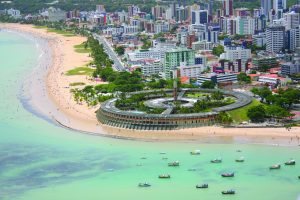The beaches of João Pessoa, capital of the State of Paraíba, are its main attractions. With the heat present throughout the year, visitors enjoy spending their days in the warm waters and on the white sands and then, enjoy the restaurants that serve seafood dishes.
The Ponta do Seixas, known for being the place where the sun rises first in Brazil (being the most easterly point of mainland Brazil), is one of the city’s most popular urban beaches. There, the Farol do Cabo Branco is located, which reaffirms that João Pessoa is the extreme eas-tern spot of the Americas.
Tambaba was the first northeastern beach dedicated to naturism. Cabo Branco and its 40 meter cliffs, weather beaten by the ocean, offers unforgettable views. Overall, there are 30 km of beaches to choose from and explore.
The Praia do Jacaré is one of the charms of JP (one of the city’s colloquial nicknames) and receives many visitors who go there to enjoy the sunset. Here, musicians play Ravel’s Bolero daily on rafts at dusk, in a colorful, special and unforgettable spectacle. João Pessoa is one of the countries major producers of rapadura (a solid sugar product that results from the processing of sugar cane) and cachaça (a sugar cane, alcoholic drink, not too dissimilar

to rum, which forms the base of the Caipirinha cocktail) and has been since the golden age of the sugar factories in the State.
Besides shellfish, abundant along the whole coast of Paraiba, two delicacies of the back country are considered typical of the region: the carne de sol (salted and sun cured beef) and the buchada de bode (a dish made with the kidneys, liver and intestines of goat). The carne de sol usually comes with cassava, green beans and delicious, clarified liquid butter. The buchada de bode is a heavy dish, based on variety of meats and prepared in the animal’s stomach.
Embroidery and crochet are among the most common handicraft techniques. They are used for purses, bedspreads, towels and are also applied on shirts. The local artisans are also experts in pottery work.
In the historic center, recognized as a Brazilian National Heritage Site, the buildings have different styles and are from different ages, in the colonial style, art nouveau and art deco. The city center is considered to have the greatest architectural collection of Paraíba.
Source: www.visitbrasil.com



